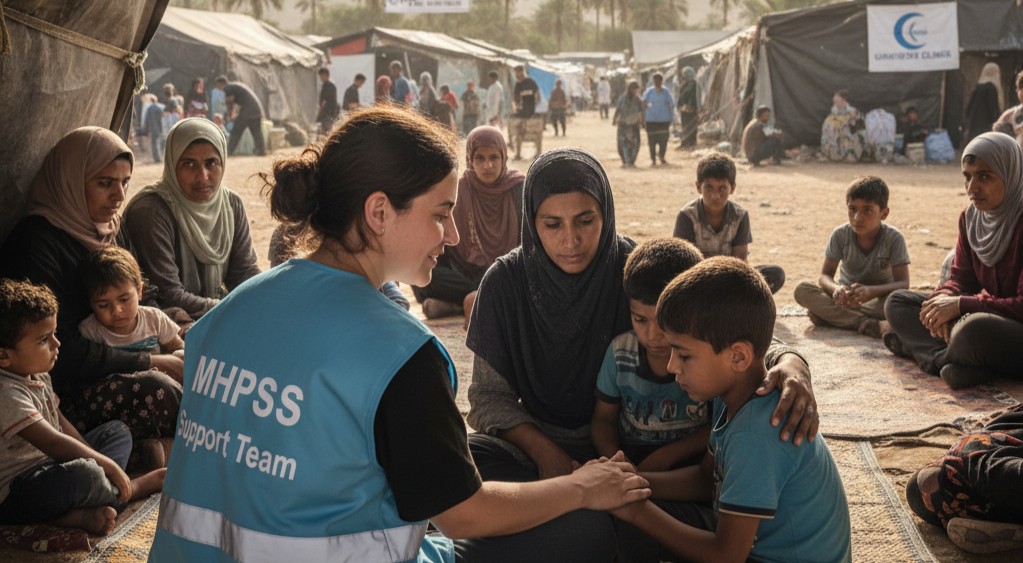
This comprehensive 5-day training course is designed to equip humanitarian professionals with the essential skills and knowledge required to provide Mental Health and Psychosocial Support (MHPSS) in emergency settings. In a humanitarian crisis, the psychological well-being of affected populations is just as critical as their physical health. This course provides a practical, hands-on approach to mastering the key components of an MHPSS response, from basic psychosocial support skills to the implementation of more specialized mental health interventions.
Throughout the training, we will cover a range of topics crucial for effective MHPSS programming. You will learn about the IASC MHPSS framework, the importance of needs assessment, and how to provide basic psychosocial support. The course also focuses on the importance of community-based approaches, case management and referral pathways, and self-care for humanitarian staff. By the end of this course, you will be able to confidently lead an MHPSS response, ensuring that aid is delivered effectively and ethically.
Who Should Attend the Training
Objectives of the Training
Personal benefits
Organizational benefits
Training methodology
Trainer Experience
Our trainers are seasoned MHPSS professionals with extensive experience in leading interventions in various humanitarian contexts. They have a strong background in both psychology and social work, bringing a wealth of real-world knowledge and practical insights to the classroom. Their expertise is grounded in both international standards and on-the-ground experience, ensuring a dynamic and highly relevant learning environment.
Quality Statement
We are committed to delivering high-quality training that is both engaging and effective. Our courses are meticulously designed to ensure participants not only grasp the core concepts but also gain practical skills that can be immediately applied in their professional roles. We believe in fostering a supportive and collaborative learning environment where every participant can thrive.
Tailor-made courses
Recognizing that every organization has unique needs, we offer tailor-made training courses. We can customize the content, duration, and methodology of our programs to address your specific challenges and goals. Contact us to discuss how we can create a specialized training solution for your team.
Course Duration: 5 days
Training fee: USD 1300
Module 1: Introduction to MHPSS in Humanitarian Settings
Module 2: The IASC MHPSS Framework
Module 3: Basic Psychosocial Support Skills
Module 4: Needs Assessment and Programme Design
Module 5: Psychosocial Support Interventions
Module 6: Mental Health Interventions
Module 7: Case Management and Referral Pathways
Module 8: Community-Based MHPSS
Module 9: Self-Care and Staff Well-being
Module 10: Practical Application and Case Study
Requirements:
Terms and Conditions
1. Discounts: Organizations sponsoring Four Participants will have the 5th attend Free
2. What is catered for by the Course Fees: Fees cater for all requirements for the training – Learning materials, Lunches, Teas, Snacks and Certification. All participants will additionally cater for their travel and accommodation expenses, visa application, insurance, and other personal expenses.
3. Certificate Awarded: Participants are awarded Certificates of Participation at the end of the training.
4. The program content shown here is for guidance purposes only. Our continuous course improvement process may lead to changes in topics and course structure.
5. Approval of Course: Our Programs are NITA Approved. Participating organizations can therefore claim reimbursement on fees paid in accordance with NITA Rules.
Booking for Training
Simply send an email to the Training Officer on training@armstrongglobalinstitute.com and we will send you a registration form. We advise you to book early to avoid missing a seat to this training.
Or call us on +254720272325 / +254725012095 / +254724452588
Payment Options
We provide 3 payment options, choose one for your convenience, and kindly make payments at least 5 days before the Training start date to reserve your seat:
1. Groups of 5 People and Above – Cheque Payments to: Armstrong Global Training & Development Center Limited should be paid in advance, 5 days to the training.
2. Invoice: We can send a bill directly to you or your company.
3. Deposit directly into Bank Account (Account details provided upon request)
Cancellation Policy
1. Payment for all courses includes a registration fee, which is non-refundable, and equals 15% of the total sum of the course fee.
2. Participants may cancel attendance 14 days or more prior to the training commencement date.
3. No refunds will be made 14 days or less before the training commencement date. However, participants who are unable to attend may opt to attend a similar training course at a later date or send a substitute participant provided the participation criteria have been met.
Tailor Made Courses
This training course can also be customized for your institution upon request for a minimum of 5 participants. You can have it conducted at our Training Centre or at a convenient location. For further inquiries, please contact us on Tel: +254720272325 / +254725012095 / +254724452588 or Email training@armstrongglobalinstitute.com
Accommodation and Airport Transfer
Accommodation and Airport Transfer is arranged upon request and at extra cost. For reservations contact the Training Officer on Email: training@armstrongglobalinstitute.com or on Tel: +254720272325 / +254725012095 / +254724452588
| Course Dates | Venue | Fees | Enroll |
|---|---|---|---|
| Feb 16 - Feb 20 2026 | Washington DC | $6,950 |
|

Armstrong Global Institute
Typically replies in minutes